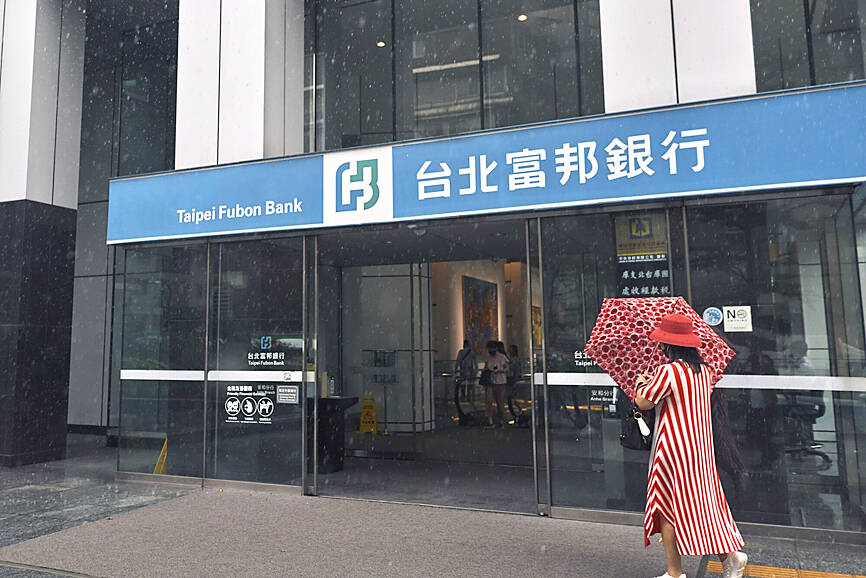Taipei Fubon Commercial Bank Co (台北富邦銀行), the banking arm of Fubon Financial Holding Co (富邦金控), has secured Financial Supervisory Commission (FSC) approval to open a branch in the Gujarat International Finance Tec-City (Gift City), a business center in western India.
The bank on Tuesday said that it canceled a plan to set up a branch in Mumbai and is eyeing Gift City, believing that the location would allow it to be more effective in serving businesses in the South Asian country.
On its Web site, Gift City says it is a global financial and technology hub that offers single-window clearances and approvals, and provides plug-and-play infrastructure for businesses hoping for fast growth.

Photo: An Rong Xu, Bloomberg
Banking Bureau Deputy Director-General Hou Li-yang (侯立洋) said India’s government has pledged preferential tax measures to encourage enterprises to go to Gift City, leading Taipei Fubon Bank to scrap its Mumbai plan and set up its first Indian branch in Gujarat.
The shift to Gift City from Mumbai was due in part to the city’s focus on international finance and technological innovation, which should help the branch strengthen its competitiveness, and take advantage of India’s population dividend and economic growth, the bank said.
The bank’s plan to open a branch in Gift City still has to receive approval from authorities in India before it can proceed.
Prior to Taipei Fubon Bank, CTBC Bank Co (中信銀行), the flagship banking subsidiary of CTBC Financial Holding Co (中信金控), obtained the green light from the FSC in January to open a branch in Gift City, but the bank has not moved in yet.
CTBC Bank has two branches in India — one in New Delhi and the other in Kattupakkam — while Bank of Taiwan Co (臺灣銀行) and Mega International Commercial Bank Co (兆豐銀行) each have a representative office in Mumbai, Hou said.

SEMICONDUCTORS: The German laser and plasma generator company will expand its local services as its specialized offerings support Taiwan’s semiconductor industries Trumpf SE + Co KG, a global leader in supplying laser technology and plasma generators used in chip production, is expanding its investments in Taiwan in an effort to deeply integrate into the global semiconductor supply chain in the pursuit of growth. The company, headquartered in Ditzingen, Germany, has invested significantly in a newly inaugurated regional technical center for plasma generators in Taoyuan, its latest expansion in Taiwan after being engaged in various industries for more than 25 years. The center, the first of its kind Trumpf built outside Germany, aims to serve customers from Taiwan, Japan, Southeast Asia and South Korea,

Gasoline and diesel prices at domestic fuel stations are to fall NT$0.2 per liter this week, down for a second consecutive week, CPC Corp, Taiwan (台灣中油) and Formosa Petrochemical Corp (台塑石化) announced yesterday. Effective today, gasoline prices at CPC and Formosa stations are to drop to NT$26.4, NT$27.9 and NT$29.9 per liter for 92, 95 and 98-octane unleaded gasoline respectively, the companies said in separate statements. The price of premium diesel is to fall to NT$24.8 per liter at CPC stations and NT$24.6 at Formosa pumps, they said. The price adjustments came even as international crude oil prices rose last week, as traders

Taiwan Semiconductor Manufacturing Co (TSMC, 台積電), which supplies advanced chips to Nvidia Corp and Apple Inc, yesterday reported NT$1.046 trillion (US$33.1 billion) in revenue for last quarter, driven by constantly strong demand for artificial intelligence (AI) chips, falling in the upper end of its forecast. Based on TSMC’s financial guidance, revenue would expand about 22 percent sequentially to the range from US$32.2 billion to US$33.4 billion during the final quarter of 2024, it told investors in October last year. Last year in total, revenue jumped 31.61 percent to NT$3.81 trillion, compared with NT$2.89 trillion generated in the year before, according to

PRECEDENTED TIMES: In news that surely does not shock, AI and tech exports drove a banner for exports last year as Taiwan’s economic growth experienced a flood tide Taiwan’s exports delivered a blockbuster finish to last year with last month’s shipments rising at the second-highest pace on record as demand for artificial intelligence (AI) hardware and advanced computing remained strong, the Ministry of Finance said yesterday. Exports surged 43.4 percent from a year earlier to US$62.48 billion last month, extending growth to 26 consecutive months. Imports climbed 14.9 percent to US$43.04 billion, the second-highest monthly level historically, resulting in a trade surplus of US$19.43 billion — more than double that of the year before. Department of Statistics Director-General Beatrice Tsai (蔡美娜) described the performance as “surprisingly outstanding,” forecasting export growth